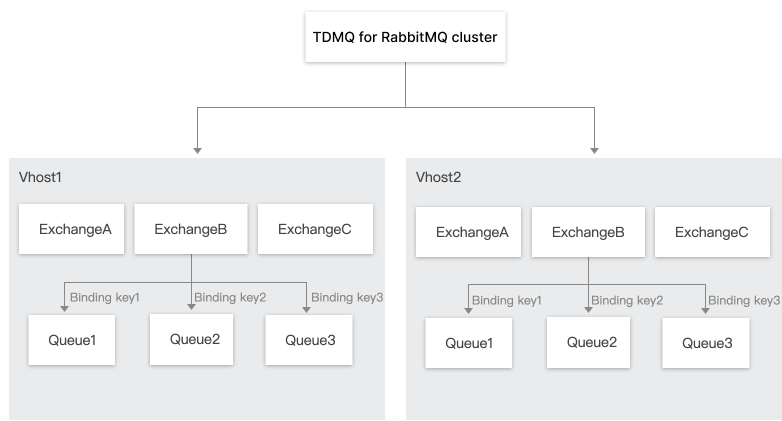TDMQ for RabbitMQ
- Release Notes and Announcements
- Product Introduction
- Relevant Concepts
- Operation Guide
- Cluster Management
- Policy List
- Monitoring alarm
- Tag Management
- Development Guide
- Practical Tutorial
- SDK Documentation
- General References
Creating Cluster
Last updated: 2024-09-10 14:49:23
Overview
Cluster is a resource dimension in TDMQ for RabbitMQ. For different clusters, their vhosts, exchanges, and queues are completely isolated from each other. It is a common practice to use respective dedicated clusters for development, test, and production environments.
This document describes how to create an exclusive cluster in the TDMQ for RabbitMQ console.

Directions
1. Log in to RabbitMQ Console.
2. Choose Cluster Management > Cluster List in the left sidebar, click Create Cluster to proceed to the purchase page.
3. On the purchase page, select the target instance specification.
Parameter | Required | Description |
Cluster Type | Yes | Select Exclusive cluster. |
Billing Mode | Yes | TDMQ for RabbitMQ exclusive cluster offers monthly subscription and pay-as-you-go billing modes. |
Region | Yes | Select a region close to resources of the deployed client. Cloud products in different regions are not interconnected over private networks and the region cannot be changed after you purchase the service. Proceed with caution. |
RabbitMQ Version | Yes | Supports versions 3.8.30 and 3.11.8. |
AZ | Yes | Select an AZ based on your business needs. Cross-AZ deployment is supported. |
Node Specification | Yes | Select an appropriate node specification based on your business needs. |
Node Count | Yes | Select an appropriate number of nodes based on your business needs. |
Single-Node Storage Specification | Yes | Message storage is billed separately, and messages can be retained without limit in the purchased storage capacity. The actual storage usage can be estimated by multiplying the message production traffic by the retention period. |
VPC | Yes | Bind the domain name of the new cluster's access point to the selected VPC. |
Mirrored Queue | No | We recommend that you enable mirrored queue to ensure the availability. After you enable it, a policy will be generated by default in the policy list in the instance details. You can delete it or customize a new policy to overwrite it. For more information, see Policy List. |
Cluster Name | No | Enter Cluster Name, which should contain 3-64 characters, can only include digits, letters, hyphens (-), and underscores (_). |
Image Queue | No | It is recommended to enable the image queue to ensure availability. Once enabled, a default policy is generated under Instance Details-Policy List, which can be deleted, or overwritten by a Custom New Policy. See Policy List. |
Tag | No |
4. Select I have read and agree to TDMQ for RabbitMQ Terms of Service and click Buy Now.
5. On the order payment page, click Pay and wait 3–5 minutes. Then, you can see the created cluster on the Cluster page.

Was this page helpful?
You can also Contact Sales or Submit a Ticket for help.
Yes
No

